Anger and Conflict Management: Leaders Guide
$14.95
Gerry Dunne, Ph.D.
Anger and Conflict Management: Leader’s Guide offers conflict management advice to adults and teens in connection with its companion text for participants, Anger and Conflict Management: Personal Handbook. The techniques illustrated encourage users to turn their anger around to interact peacefully and productively with associates and family. Leaders learn how to conduct presentations, guide discussions, and help participants understand the purposes and pitfalls of anger and how to channel it into constructive and useful actions. The personal handbook is a guided journal with information, ideas, short stories, and questions for students to answer in writing, enabling them to examine their personal responses to life’s typical anger-provoking situations at home, work, school, and elsewhere.
These books are ideal for a wide variety of audiences including groups in corporations, social service agencies, schools, churches, and adults and teens who are required by juvenile and family courts to participate in anger management classes.
Table of Contents
Dear Colleague
- Getting Ready
- Class Structure
- When is it too late for new participants to join the class?
- What about tuition and the Personal Handbooks?
- Why combine teens and adults?
- Tips for Conducting the Activities
- Outreach
- Determining and Reporting Results
- Last Word
- Author’s Biography
Agenda, First Class Session
- Greetings and Introductions
- Overview of participant’s Personal Handbook
- Review of Guiding Principles for the Class
- Activity: “How Does Your Own Anger Affect You?”
- Groups of Four: “Dealing with Anger”
- Presentation: “Appropriate and Inappropriate Anger”
- Groups of Four: “Anger: Feel It and Channel It”
- Challenges for the Coming Week: Homework and Life Work
Agenda, Second Class Session
- Greetings and Opening Discussion
- Review of Information in First Session
- Groups of Four: “An Appropriate Anger Experience During the Past Week”
- Presentation and Discussion: “When Anger Happens in Families”
- Team Planning Session and Team Reports: “Stepping In”
- Presentation and Dyads: “What Does It Take to Use Your Anger Constructively?”
- Challenges for the Coming Week: Homework and Life Work
Agenda, Third Class Session
- Greetings and Opening Discussion
- Review of Information in Second Session
- Guided Discussion: “What Good Communicators Do and Don’t Do”
- Dyads: “When The Eyes Make Contact”
- Team Planning Session, Scenario Presentations, and Discussion: “Your Body
- Speaks Your Truth”
- Presentation and Role Play: “The Communication Stoppers”
- Presentation: “The Highest Level of Listening”
- Challenges for the Coming Week: Homework and Life Work
Agenda, Fourth Class Session
- Greetings and Opening Discussion
- Review of Information in Third Session
- Presentation, Dyads and Discussion: “Hearing with the Third Ear”
- Presentation and Discussion: “Becoming Assertive!”
- Presentation, Dyads and Discussion: “Conflict Happens!”
- Team Planning and Presentations: “Conflict Management Strategies”
- Dyads and Discussion: “What Strategy Would You Use?”
- Challenges for the Coming Week: Homework and Life Work
Agenda, Fifth Class Session
- Greetings and Opening Discussion
- Review of Information in Fourth Session
- Groups of Four: “How Constructive and Destructive Actions Affect Us”
- Team Planning Session, Presentations and Discussion: “When the Going Really Gets Tough”
- Challenges for the Rest of Our Lives: Homework and Life Work
- Distribution of Certificates
- Class Evaluation
Participant Certificate
Participant Evaluation Form
Sample Flyer 1
Sample Flyer 2
Dear Colleague
Welcome to the fulfilling challenge of teaching Anger and Conflict Management!
Whether you are an employed leader/trainer and will conduct the class as part of your job, or an independent contractor offering the class to various organizations for free or pay, I encourage you to follow this guide blended with your own creative contributions. The guide is geared to help participants derive maximum meaning from their text/guided journal, Anger and Conflict Management: Personal Handbook, in a lively, experiential and safe class atmosphere. Added to that, your unique personality and ideas will make the class come alive!
I developed this class over the latter part of 2002 and early 2003 while teaching it on a regular basis to one group after another as an independent contractor with the North (Clark) County Community Food Bank in Battle Ground, Washington where I live. The classes have been supported by a grant from Washington Mutual Foundation and are very well received. At this writing expansion to nearby communities is being planned. (More on this in the “Outreach” section, later.)
On these pages I offer some tips and ideas–ways to conduct and advertise the class that work well for me.
Adult, 64 pages, 8-1/2 x 11, paperback
Description
Gerry Dunne, Ph.D.
Anger and Conflict Management: Leader’s Guide offers conflict management advice to adults and teens in connection with its companion text for participants, Anger and Conflict Management: Personal Handbook. The techniques illustrated encourage users to turn their anger around to interact peacefully and productively with associates and family. Leaders learn how to conduct presentations, guide discussions, and help participants understand the purposes and pitfalls of anger and how to channel it into constructive and useful actions. The personal handbook is a guided journal with information, ideas, short stories, and questions for students to answer in writing, enabling them to examine their personal responses to life’s typical anger-provoking situations at home, work, school, and elsewhere.
These books are ideal for a wide variety of audiences including groups in corporations, social service agencies, schools, churches, and adults and teens who are required by juvenile and family courts to participate in anger management classes.
Table of Contents
Dear Colleague
- Getting Ready
- Class Structure
- When is it too late for new participants to join the class?
- What about tuition and the Personal Handbooks?
- Why combine teens and adults?
- Tips for Conducting the Activities
- Outreach
- Determining and Reporting Results
- Last Word
- Author’s Biography
Agenda, First Class Session
- Greetings and Introductions
- Overview of participant’s Personal Handbook
- Review of Guiding Principles for the Class
- Activity: “How Does Your Own Anger Affect You?”
- Groups of Four: “Dealing with Anger”
- Presentation: “Appropriate and Inappropriate Anger”
- Groups of Four: “Anger: Feel It and Channel It”
- Challenges for the Coming Week: Homework and Life Work
Agenda, Second Class Session
- Greetings and Opening Discussion
- Review of Information in First Session
- Groups of Four: “An Appropriate Anger Experience During the Past Week”
- Presentation and Discussion: “When Anger Happens in Families”
- Team Planning Session and Team Reports: “Stepping In”
- Presentation and Dyads: “What Does It Take to Use Your Anger Constructively?”
- Challenges for the Coming Week: Homework and Life Work
Agenda, Third Class Session
- Greetings and Opening Discussion
- Review of Information in Second Session
- Guided Discussion: “What Good Communicators Do and Don’t Do”
- Dyads: “When The Eyes Make Contact”
- Team Planning Session, Scenario Presentations, and Discussion: “Your Body
- Speaks Your Truth”
- Presentation and Role Play: “The Communication Stoppers”
- Presentation: “The Highest Level of Listening”
- Challenges for the Coming Week: Homework and Life Work
Agenda, Fourth Class Session
- Greetings and Opening Discussion
- Review of Information in Third Session
- Presentation, Dyads and Discussion: “Hearing with the Third Ear”
- Presentation and Discussion: “Becoming Assertive!”
- Presentation, Dyads and Discussion: “Conflict Happens!”
- Team Planning and Presentations: “Conflict Management Strategies”
- Dyads and Discussion: “What Strategy Would You Use?”
- Challenges for the Coming Week: Homework and Life Work
Agenda, Fifth Class Session
- Greetings and Opening Discussion
- Review of Information in Fourth Session
- Groups of Four: “How Constructive and Destructive Actions Affect Us”
- Team Planning Session, Presentations and Discussion: “When the Going Really Gets Tough”
- Challenges for the Rest of Our Lives: Homework and Life Work
- Distribution of Certificates
- Class Evaluation
Participant Certificate
Participant Evaluation Form
Sample Flyer 1
Sample Flyer 2
Dear Colleague
Welcome to the fulfilling challenge of teaching Anger and Conflict Management!
Whether you are an employed leader/trainer and will conduct the class as part of your job, or an independent contractor offering the class to various organizations for free or pay, I encourage you to follow this guide blended with your own creative contributions. The guide is geared to help participants derive maximum meaning from their text/guided journal, Anger and Conflict Management: Personal Handbook, in a lively, experiential and safe class atmosphere. Added to that, your unique personality and ideas will make the class come alive!
I developed this class over the latter part of 2002 and early 2003 while teaching it on a regular basis to one group after another as an independent contractor with the North (Clark) County Community Food Bank in Battle Ground, Washington where I live. The classes have been supported by a grant from Washington Mutual Foundation and are very well received. At this writing expansion to nearby communities is being planned. (More on this in the “Outreach” section, later.)
On these pages I offer some tips and ideas–ways to conduct and advertise the class that work well for me.
Adult, 64 pages, 8-1/2 x 11, paperback

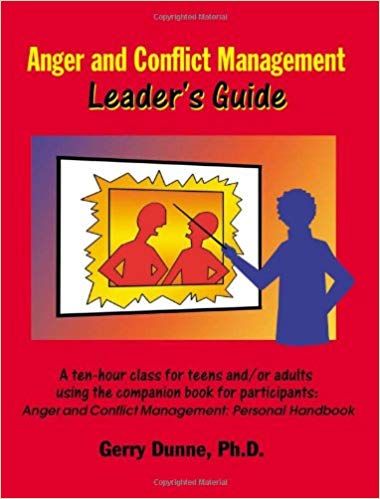
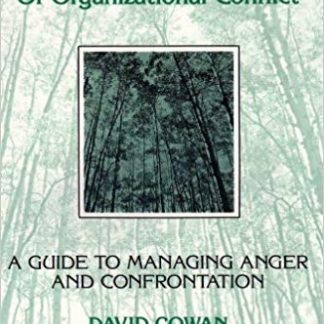
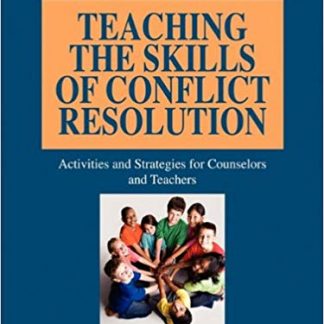
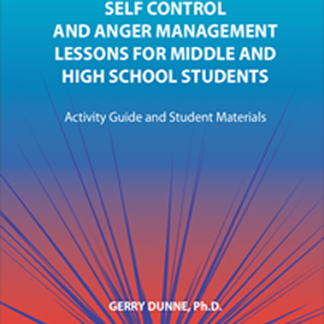
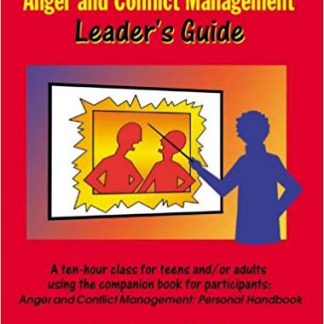
Reviews
There are no reviews yet.